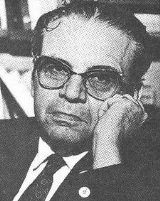
Mariano Picón Salas
Encyclopedia
Mariano Federico Picón Salas, an influential Venezuela
n diplomatic, cultural critic and writer of the 20th century, was born in Mérida
(Mérida State) on January 26, 1901 and died in Caracas
on January 1, 1965. Among his books, his collection of essays on history, literary criticism and cultural history are remarkable.
He travelled a lot through the Americas. His work is also important because of his wide perspective, studying the culture of the entire continent. He left Venezuela, under the political persecution of dictator Juan Vicente Gómez
. Living for a large period in Chile
, he studied History gaining the degree of “Profesor de Historia” and later the Doctorate on Philosophy and Letters.
He came back to Venezuela in 1936, working as a professor and author. He founded the Asociación de Escritores de Venezuela (Writers Association from Venezuela), and worked for the Ministry of Education.
His studies on "Barroco de Indias" (the term that he coined to talk about the baroque from Hispanic America) are very influential among the general study of Baroque
.
He received the National Prize for Literature
in 1954.
He taught at Columbia University
, New York.
He was twice married. First to Isabel Cento, with whom he had a daughter named Delia Isabel Picón de Morles Hernández, and to socialite Beatriz Otáñez.
Venezuela
Venezuela , officially called the Bolivarian Republic of Venezuela , is a tropical country on the northern coast of South America. It borders Colombia to the west, Guyana to the east, and Brazil to the south...
n diplomatic, cultural critic and writer of the 20th century, was born in Mérida
Mérida, Mérida
Santiago de los Caballeros de Mérida, Venezuela, is the capital of the municipality of Libertador and the state of Mérida, and is one of the principal cities of the Venezuelan Andes...
(Mérida State) on January 26, 1901 and died in Caracas
Caracas
Caracas , officially Santiago de León de Caracas, is the capital and largest city of Venezuela; natives or residents are known as Caraquenians in English . It is located in the northern part of the country, following the contours of the narrow Caracas Valley on the Venezuelan coastal mountain range...
on January 1, 1965. Among his books, his collection of essays on history, literary criticism and cultural history are remarkable.
He travelled a lot through the Americas. His work is also important because of his wide perspective, studying the culture of the entire continent. He left Venezuela, under the political persecution of dictator Juan Vicente Gómez
Juan Vicente Gómez
Juan Vicente Gómez Chacón was a military general and de facto ruler of Venezuela from 1908 until his death in 1935. He was president on three occasions during this time, and ruled as an unelected military strongman for the rest of the era.-Early years:Gómez was a barely literate cattle herder and...
. Living for a large period in Chile
Chile
Chile ,officially the Republic of Chile , is a country in South America occupying a long, narrow coastal strip between the Andes mountains to the east and the Pacific Ocean to the west. It borders Peru to the north, Bolivia to the northeast, Argentina to the east, and the Drake Passage in the far...
, he studied History gaining the degree of “Profesor de Historia” and later the Doctorate on Philosophy and Letters.
He came back to Venezuela in 1936, working as a professor and author. He founded the Asociación de Escritores de Venezuela (Writers Association from Venezuela), and worked for the Ministry of Education.
His studies on "Barroco de Indias" (the term that he coined to talk about the baroque from Hispanic America) are very influential among the general study of Baroque
Baroque
The Baroque is a period and the style that used exaggerated motion and clear, easily interpreted detail to produce drama, tension, exuberance, and grandeur in sculpture, painting, literature, dance, and music...
.
He received the National Prize for Literature
National Prize for Literature (Venezuela)
The National Prize for Literature is a literary award made annually to Venezuelan writers.* 1948 Mario Briceño Iragorry...
in 1954.
He taught at Columbia University
Columbia University
Columbia University in the City of New York is a private, Ivy League university in Manhattan, New York City. Columbia is the oldest institution of higher learning in the state of New York, the fifth oldest in the United States, and one of the country's nine Colonial Colleges founded before the...
, New York.
He was twice married. First to Isabel Cento, with whom he had a daughter named Delia Isabel Picón de Morles Hernández, and to socialite Beatriz Otáñez.
Works
- Las nuevas corrientes de arte (1917)
- Buscando el camino (1920)
- Mundo imaginario (1927)
- Hispanoamérica: posición crítica, literatura y actitud americana: sentido americano del disparate y sitio de una generación (1931)
- Registro de huéspedes (1934)
- Intuición de Chile y otros ensayos en busca de una conciencia histórica (1935)
- Preguntas a Europa (1938)
- Cinco discursos sobre pasado y presente de la nación venezolana (1940)
- Odisea de Tierra Firme: relatos de Venezuela (1940)
- Un viaje y seis retratos (1940)
- Formación y proceso de la literatura venezolana (1940)
- Viaje al amanecer (1943)
- De la Conquista a la Independencia (México, 1944)
- Biografía de Francisco de Miranda (1946)
- Formación y Proceso de la Literatura Venezolana (1947)
- Comprensión de Venezuela (1949)
- Pedro Claver, el Santo de los Esclavos (1950)
- Dependencia e Independencia en la Historia hispanoamericana (1952)
- Los días de Cipriano Castro (1953)
- Crisis, cambio, tradición (1955)
- Regreso de tres mundos: un hombre en su generación (1959)
- Los Malos salvajes. Civilización y política contemporáneas (1962)
- Hora y Deshora. Temas humanísticos; nombres y figuras, viajes y lugares (1963)
- Tres sonetos del desengaño (1965)
- Prólogo al Instituto Nacional de Cultural (posthumous) (1965)

